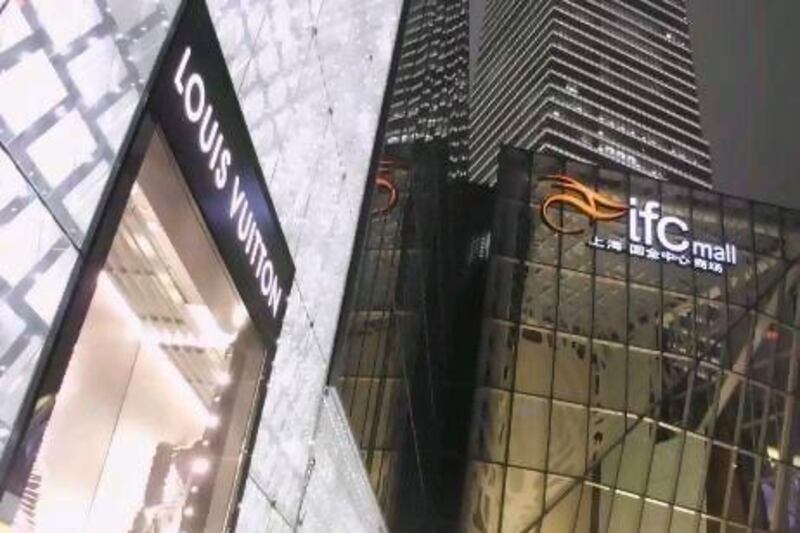SHANGHAI // Decorated with gold, silver and shining glass, the vast stores here that sell luxury watches, handbags, clothes and shoes are drawing in the local elite for a Saturday evening of no-expense-spared retail therapy.
In Shanghai's riverside Pudong district, a mass of thrusting skyscrapers and space-age observation towers, a pair of diamond-encrusted Cartier earrings is on display for an eye-watering 615,000 yuan (Dh358,003), while a watch retails for 330,000 yuan.
Despite the stratospheric prices, there is no shortage of customers in the IFC Mall, home to "over 100 global flagship of luxury international brands" as a billboard proclaims.
China's high flyers from business and industry, with their wallets and purses bulging after heady years of double-digit economic growth, are the world's key growth market for luxury goods.
Young, expensively dressed women, sometimes accompanied by middle-aged men, as well as 30-something couples and the occasional student, are all drawn in by these vast stores and their exclusive wares.
Li Ruihua, 34, an advertising executive, is admiring handbags, which sell at the Louis Vuitton store for 10,200 yuan. Ms Li claims to have once paid 30,000 yuan for a single bag.
"It's the glamour, the branding, the heritage. I think people can use the famous brands to express their status," she said.
In 2010, 87 billion yuan was spent on luxury goods in China, ranking the country fifth worldwide. Add Hong Kong and Macau, where 80 per cent of luxury goods sales are to mainland Chinese buyers, and China ranks third.
It could soon rise further. According to Bruno Lannes, a partner at the Shanghai office of the consultancy Bain and Company, sales of luxury goods in China grew 25 to 30 per cent last year to about 110 billion yuan. Mr Lannes expects a similar increase this year.
Yet the high local taxes on luxury goods have sent many Chinese people shopping abroad, travelling to Hong Kong, Dubai, Paris or New York.
To counter that exodus, stores in China have invested millions to lure in customers and encourage spending at home. Forget the chic little boutiques of the Champs-Élysées or Manhattan. Outlets selling luxury goods in China are on a different scale.
"The brands are trying to improve the customer experience by creating these consumption cathedrals," Mr Lannes said at the China Europe International Business School's recent Prestige Brands Forum in Shanghai.
"This is what the brands are doing to make sure they continue to attract consumers in mainland China. They're acquiring the lease to the second and third floors."
Stores in China selling prestige brands could become even busier, as the country's former deputy minister of commerce, Wei Jianguo, indicated last week that the country may cut import duties on luxury goods.
In Pudong, high-end shopping malls share the shadow of the 492-metre Shanghai World Financial Centre, the world's third tallest building. Under construction next door is the Shanghai Tower, which, at 632 metres, is destined to become the world's second-tallest building, after Dubai's Burj Khalifa.
Yet the inequalities plaguing modern-day China are not far away. Nearby on the street, migrant workers sell sweet potatoes for 5 yuan per half kilo, and pirated DVDs for 5 yuan each.
While luxury brands are popular in China, their true value may not always be appreciated. "Chinese consumers do not have good taste in luxury consumption. They buy things just because a magazine or luxury website told them it is worth buying," Helen Wu, a Shanghai television entertainment editor, said last year in heavily reported comments.
And not all those shopping for luxuries could be described as rich. Such is China's enthusiasm for luxury brands that even modestly paid employees like Wang Qiuli are visiting the stores.
The 23-year-old, who works for Shanghai's Horizon Center of Youth Entrepreneurship for Society, saved her wages from a part-time college job to buy a US$2,000 (Dh7,346) Longines watch last October.
"It's just for myself. I like it. When I left college, I thought I would buy something for me," she said.
The preoccupation with status linked to prestige brands is stronger in China than other parts of East Asia, believes Jun Kim, 28, a computer engineer from South Korea looking for shoes. He already owns a pair of John Lobb shoes that cost about US$1,200.
"Social status, that's the important point. If a girl has a good bag, like a Hermès, people regard her as a very special person. The luxurious bag makes their social status higher and higher," he said.
"Only the Chinese people think like that. In Korea a girl likes a luxurious bag, but the desire is not too high."
China's trade economy slips, b8






